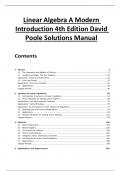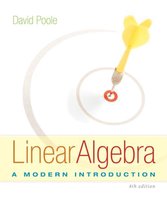Prüfung
Complete Solution Manual Linear Algebra A Modern Introduction 4th Edition David Poole
- Kurs
- Hochschule
- Book
Linear Algebra A Modern Introduction 4th Edition David Poole Solutions Manual Complete Solution Manual Linear Algebra A Modern Introduction 4th Edition David Poole PDF File All Pages All Chapters Grade A+
[ Mehr anzeigen ]




